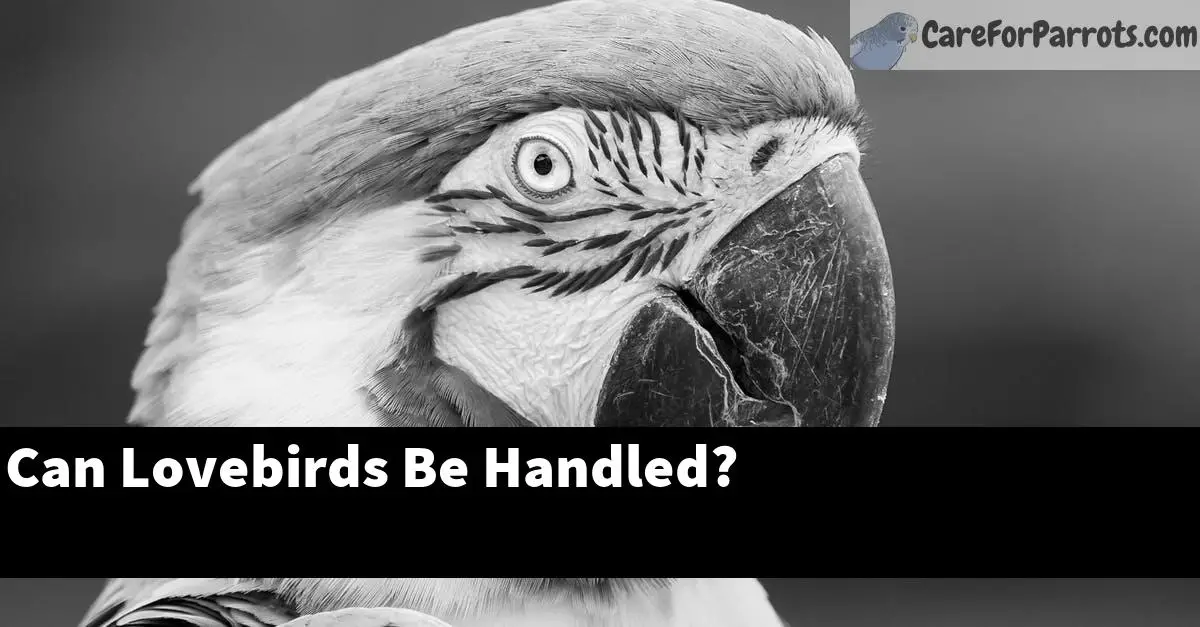Yes, lovebirds can be handled and trained. Handling a lovebird will help to keep it healthy and happy. Lovebirds can be trained to do tricks, sing songs, and more.
Table of Contents
Can lovebirds be handled without being scared?
There is no one definitive answer to this question, as each individual may react differently to being handled by a lovebird. Some people may find lovebirds to be gentle and loving creatures, while others may be more apprehensive and scared.
Ultimately, it is up to the individual handler to decide if they are comfortable handling a lovebird. Some general tips to keep in mind when handling lovebirds include being aware of their surroundings and keeping a close eye on them at all times.
Additionally, it is important to always use caution and keep fingers and hands away from the bird’s beak, as they can inflict severe damage if provoked.
What is the best way to handle a lovebird?
There is no one-size-fits-all answer to this question. Every bird is unique and will respond differently to different types of handling.
However, some general tips that may be helpful include providing a safe and stimulating environment, providing plenty of food and water, and providing regular exercise.
Lovebirds are social birds and need companionship in order to be happy.
If you have a lovebird, it is important to provide a safe and stimulating environment for it. Make sure its cage has plenty of toys and perches, and provide regular exercise so it can keep its energy levels up.
Providing a safe and stimulating environment is key to ensuring that your lovebird is happy and healthy.
How do you tame a lovebird?
There are a few different ways to tame a lovebird. One way is to feed them small pieces of food every few minutes.
Another way is to put them in a cage with a perch and a toy. Another way is to talk to them and play with them.
Why do people want to handle lovebirds?
People often want to handle lovebirds because they are beautiful birds and they make great pets. Handling a lovebird can be a fun experience for people, and it can help them learn more about the birds.
Handling a lovebird can also help people learn how to care for the bird properly.
What are the benefits of handling a lovebird?
There are many benefits to handling a lovebird, both for the bird and the handler. A lovebird is a tame bird, meaning it is easy to handle and is not likely to bite.
Lovebirds are also very social animals and will enjoy being around people. They are excellent companions and make great pets.
Are there any risks to handling a lovebird?
There is no definitive answer to this question as it depends on the individual bird and their overall health. However, some general risks that may apply to all pet birds include:
• Exposure to disease: Lovebirds are susceptible to a number of infectious diseases, including salmonella, parakeets can catch psittacosis, and canary birds can get brain worm.
It is important to keep your bird healthy and vaccinated to prevent these illnesses.
• Injuries: Lovebirds are naturally curious and often fly into things, which can lead to broken bones or other injuries.
Make sure you keep your bird safe by providing a safe bird perch and by supervising playtime.
• Death: Although very rare, lovebirds can die from a number of causes including disease, accidents, and suicide.
Be sure to keep an eye on your bird and make sure they are getting the proper care and attention.
What should you do if a lovebird bites you while handling it?
If a lovebird bites someone while being handled, the best course of action is to immediately stop touching the bird and seek medical attention. The bird may have been startled and may be in pain.
If the bird is not being handled at the time of the bite, it is not likely to bite again.
Summary
A lovebird is a type of bird that can be handled and trained. Handling a lovebird will help to keep it healthy and happy.
Lovebirds can be trained to do tricks, sing songs, and more.






